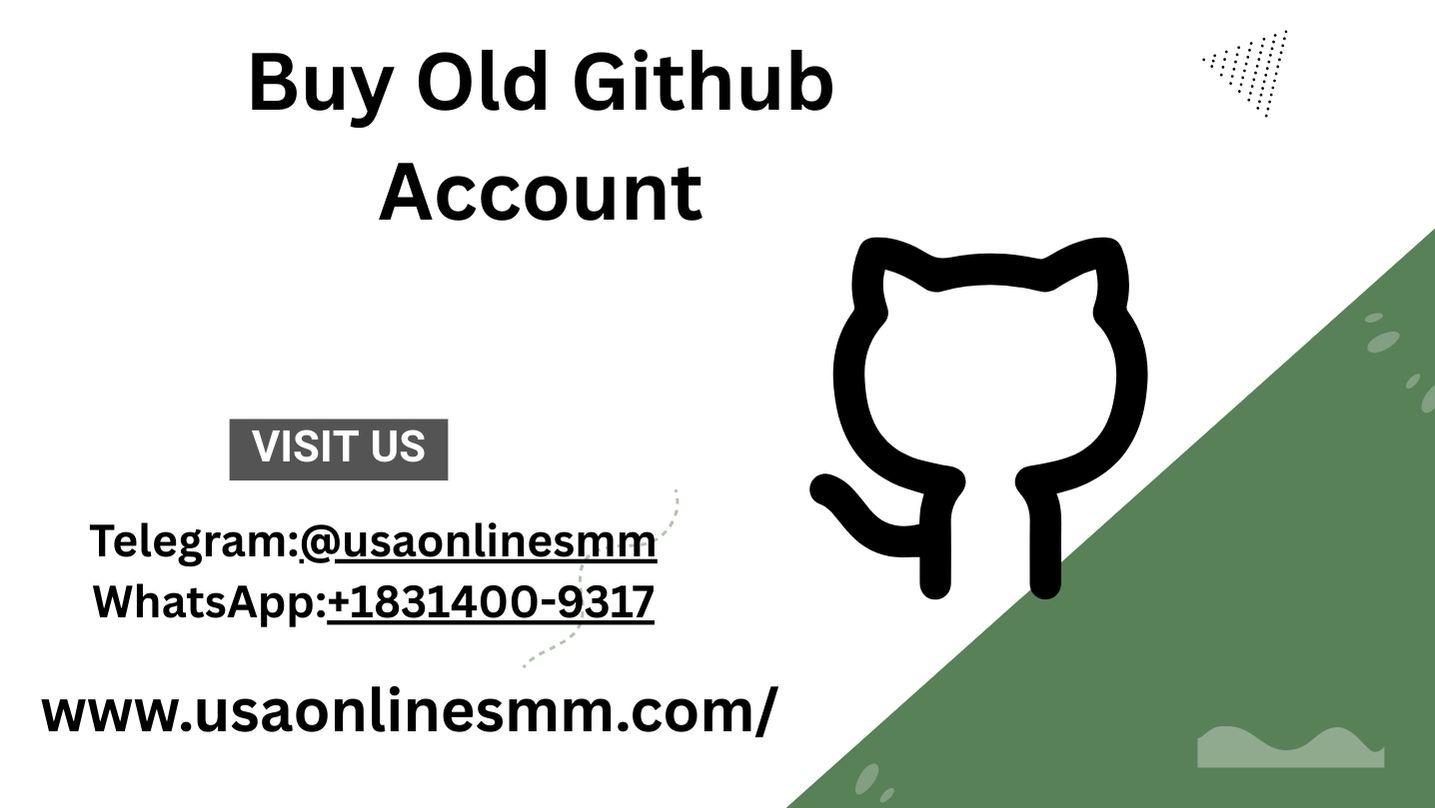Buy Old Github Account
In the modern world of software development and coding, having a strong online presence is crucial. One of the platforms that developers rely on heavily is Github, a place to showcase code, collaborate with* others, and contribute *to open-source projects. For those looking to establish credibility quickly, buying an old Github account has emerged as an option. While creating a new account is always available, older accounts come with advantages that are attractive to many developers and companies.
If you want to more information just knock us 24-hour reply
Telegram:@usaonlinesmm
WhatsApp:+1831400-9317
Benefits of Buying an Old Github Account
When you decide to buy an old Github account, you unlock several opportunities that a fresh account simply cannot provide. An aged account often comes with a history of contributions, repositories, and followers, which can enhance your visibility in the developer community. Search engines also tend to trust older accounts more, which can improve the discoverability of your projects. Furthermore, older accounts often have established networks, allowing you t*o connect with other developers* more quickly.
Understanding Github Account Value
Not all Github accounts are created equal. Some accounts have significant value due to their active repositories, contribution history, and follower base. When buying an old Github account, it is essential to understand these factors to ensure you are making a sound investment. An account with consistent commits over time, participation in prominent projects, and a solid follower count can significantly boost your online reputation.
Risks Associated with Buying Old Github Accounts
Despite the benefits, there are inherent risks in purchasing old Github accounts. Accounts may have been previously used for malicious activities or might be flagged by Github for suspicious behavior. There is also the possibility that the account could have its previous email or recovery information still attached, which may lead to security issues. It is crucial to thoroughly vet any account before completing a purchase.
Legal and Ethical Considerations
Buying old Github accounts exists in a legal and ethical gray area. While Github’s terms of service prohibit account sales, many transactions happen discreetly. It is important to understand the risks, including potential account suspension. Ethically, some argue that it undermines the authenticity of contribution metrics, while others see it as a legitimate way to gain a head start in a competitive space.
How to Safely Purchase an Old Github Account
To mitigate risks when buying an old Github account, follow specific steps. First, verify the account’s history and reputation by reviewing repositories, commits, and followers. Ensure that the account has not been involved in spam or malicious activities. Next, request a secure transfer process that allows you to take full ownership, including updating email and recovery information. Finally, consider changing passwords, enabling two-factor authentication, and reviewing connected apps for added security.
Choosing the Right Account for Your Needs
When selecting an old Github account, consider your objectives. If your goal is visibility and credibility, prioritize accounts with active contributions and significant engagement. For collaborative work, focus on* accounts with established networks in relevant programming communities. Understanding your specific needs will help you choose an account that aligns with your goals.
Benefits of Aged Repositories
One reason developers invest in old Github accounts is access to aged repositories. These repositories often have a long history of commits, stars, and forks, which can enhance the credibility of your projects. Search engines recognize the longevity of content, making these repositories more likely to rank higher in searches. Additionally, contributing to or maintaining aged repositories can create networking opportunities with other developers in the same domain.
Building Trust with an Old Account
An old Github account can provide instant trust and credibility among peers and potential employers. A well-established account reflects commitment and expertise, which is particularly valuable for freelance developers or small teams trying to establish a presence. With proper management, the account can showcase your work, provide social proof, and improve your chances of collaboration with reputable developers.
Maintaining Security After Purchase
After buying an old Github account, security should be a top priority. Begin by changing all login credentials and enabling two-factor authentication. Review connected applications, repositories, and any active sessions to ensure no unauthorized access remains. Regularly monitor activity to prevent misuse, and avoid linking the account to untrusted third-party tools. Maintaining strong security practices is essential to protecting your investment.
Maximizing the Potential of Your New Account
Once you have purchased an old Github account, focus on leveraging its potential. Update repositories, continue contributing to active projects, and engage with followers. Consider creating new repositories that highlight your skills and interests. Maintaining regular activity signals to the Github community that the account is actively managed, preserving the benefits of its established history.
Alternatives to Buying Old Accounts
For developers hesitant about purchasing old Github accounts, there are alternatives to consider. Building a new account organically may take time but ensures full control and avoids potential violations of terms of service. Additionally, contributing to open-source projects, participating in coding communities, and creating high-quality repositories can help establish credibility naturally. These methods may take longer but provide a sustainable foundation for long-term success.
Evaluating Account Authenticity
Before committing to buy, evaluate the authenticity of any old Github account. Check contribution patterns, repository quality, and follower activity to ensure the account has been genuinely used. Avoid accounts with sudden spikes in activity or suspiciously high numbers of followers, as these may indicate artificial manipulation. Authentic accounts offer long-term benefits and minimize the risk of suspension.
Long-Term Benefits of a Trusted Account
Owning a reputable old Github account can have long-term advantages. Established accounts often gain more visibility in search results, attract collaboration opportunities, and can serve as a portfolio for potential employers or clients. Over time, consistent contributions and engagement can further enhance credibility, turning the account into a valuable asset in your professional toolkit.
Strategies for Growth After Acquisition
After acquiring an old Github account, implement strategies for growth to maximize its impact. Engage with other developers by contributing to popular projects, answering queries, and participating in discussions. Update repositories with new projects, tutorials, or guides relevant to your skills. Maintaining a visible and active presence ensures the account remains valuable and influential in the developer community.
Understanding Market Trends
The demand for old Github accounts has grown alongside the rise of competitive coding and freelancing. Developers seek accounts with a proven history to enhance credibility and save time. Understanding market trends, such as popular programming languages, repository types, and engagement strategies, helps in selecting an account that aligns with current industry needs.
Conclusion
Buying an old Github account is a strategic decision that offers numerous advantages but comes with risks. By carefully evaluating accounts, ensuring security, and leveraging *the account effectively, you can gain credibility, access valuable repositories, and build a professional presence more quickly. While it is important to consider legal and ethical implications, a well-chosen and responsibly managed account can serve as a powerful tool for career advancement and networking in the software development world.




Discussion (0)